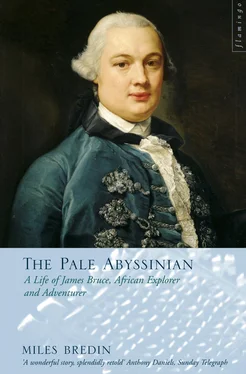In spite of his prolixity, it is the things that Bruce left out of his life’s work that make him so fascinating. There are many detectable errors in the book (carelessly, he failed to consult his notes) but there are also eloquent omissions and deliberate evasions which contributed to his not being believed on his return. He failed to address the rumour that he had killed the artist who accompanied him and indeed scarcely refers to him in the book. He makes almost no mention of the Ark of the Covenant when one of the few things then known about Abyssinia was that it was claimed to be guarding the Ark. It was, though, his manner which did the greatest damage to his credibility.
Haughty and proud (the portmanteau word ‘paughty’ might almost have been coined for him), he once forced a visitor to eat raw meat after the unfortunate man had expressed doubt at its being the Abyssinians’ favourite dish. Bruce brooked no criticism and eventually refused to discuss his work with anyone except an adoring audience. He was prickly even to his disciples. Too great a display of amazement at his astonishing stories was often interpreted as disbelief and no one was allowed to accuse Bruce of lying and walk away. An expert swordsman from a long line of pugnacious ancestors, he gained notoriety after challenging his former fiancée’s husband to a duel. It was understood that the same treatment would be handed out to what he called his ‘chicken-hearted critics’.
He was born in 1730, with the blood of the Hays and the Bruces, both families famous for their martial history, coursing through his veins. In a century of almost continuous warfare, however, 1730 was a surprisingly peaceful time to arrive. The Treaty of Seville between France, Spain and England had been signed the year before and had produced a temporary lull in the Catholic – Protestant wars that dominated the period. James’s father, David Bruce of Kinnaird, was a Hay of Woodcockdale (a scion of the better known Hays of Errol), a family that fought with honour at Bannockburn and still one of the oldest in Scotland. David’s father had been forced by contract to adopt his wife’s name – Bruce – which can be traced in a moderately straight line to Robert the Bruce, in order to inherit the estate of Kinnaird. The two great Scottish families had been inextricably linked since before Bannockburn and the marriage was merely another link between them.
For a young Scot with such a surname, born so soon after the Act of Union of 1707, it would seem inevitable that James should support the Jacobites, but this was not the case. His father, David, had endured an extremely close brush with death in the aftermath of the 1715 uprising with which he had been intimately involved. He had been sentenced to death and had only escaped the gallows because of the reluctance of Scottish judges to execute Scots accused of breaking English laws. This had been a chastening experience and he was adamant that his son should not follow in his rebellious footsteps. Having died of a ‘lingering illness’, probably tuberculosis, before James’s fourth birthday, his mother Marion had no influence on his upbringing. Whilst Bonnie Prince Charlie was being brought up in exile, so too was James, the former in Catholic France, the latter in staunchly Protestant England. The Young Pretender and his army actually marched past Kinnaird on the way to the final showdown at Culloden but the young James was not there to witness it, nor the Battle of Falkirk which was fought a few miles away. Instead he was in London being raised as an English gentleman. He was forever to remain one.
Well before the ’45 uprising, David Bruce was showing a vulnerability to the charms of women that his son was to inherit. Having fathered James with Marion Graham, he went on to father six more sons and two daughters with his second wife, Agnes Glen. Preoccupied by this frenzied period of procreation and fearful that his son would be caught up in the Jacobite machinations of their Stirlingshire neighbours, the laird of Kinnaird contrived to send his son as far away from their influence as possible. At the age of eight, James was sent to London where for the next few years he lived with the family of his uncle, William Hamilton. From 1738 he was taught both by Counsellor Hamilton and by a Mr Graham who had a small private school in London, but by 1742 it was decided that he needed more formal education. He was sent to Harrow, where he excelled.
In the eighteenth century Harrow was still outside London and it was a respected school. The few hundred boys with whom James was educated would go on to be ministers, courtiers and landowners. Much more so than today, Harrow and the few schools like it were of immense importance to a child’s future. The really important families like the Cecils, Pelhams and Cavendishes had just started sending their sons away to school rather than having them educated at home by tutors. They sent them to one of five schools – Charterhouse, Eton, Harrow, Winchester or Westminster. By 1800, three-quarters of the English peerage (who comprised the court and the House of Lords and largely controlled the House of Commons) had been educated at one or other of the latter four. James and his two greatest friends, William Hamilton and William Graham, were all first-generation Harrovians. By breaking with family tradition and sending James away, David ensured that his son would always be a member of the British ruling classes rather than the obscure Scottish laird he was otherwise destined to become.
James was an excellent student and soon learned the basic necessities for a young gentleman in the eighteenth century – Latin, Greek, French, philosophy and arithmetic. He also developed a wide circle of friends which he would retain throughout his life and which would become extremely important to him in later years. By all accounts he was a paragon of virtue. In 1744, his stepmother’s brother described him thus: ‘What I wrote to you about James, is all true, with this difference only, that you may say, as the Queen of Sheba said to Solomon, the one half has not been told you, for I never saw so fine a lad of his years in my life.’ His headmaster at Harrow, Dr Cox, praised him in even more glowing terms: ‘He is as promising a young man as ever I had under my care, and, for his years, I never saw his fellow.’
This was no pandering to wealthy parents; James was neither grand nor well off compared with his fellow pupils. Dr Cox reinforced his claims by asking James to give the annual pupils’ address to the school, which he did brilliantly in Latin, as was the custom. This was heady tribute to any boy at one of England’s best schools, but as his mind grew his health began to fail him. A weak chest, inherited from his mother, combined with his great height (in an age when the average was five feet seven) contrived to make him very ill in his teens. With dark red hair and a body shaken with coughing, at fifteen he must have been a bizarre sight, resembling a victim of the rack.
David’s plan to keep his son James away from their rebellious neighbours had worked well and it became more likely that James would be operating the rack rather than lying upon it. Indeed he became a fanatical Hanoverian, making firm alliances with his new English friends, whilst losing contact with the acquaintances of his Scottish childhood. William Graham (who, interestingly, was also his uncle) and William Gerrard Hamilton were in fact born Scottish but they were enjoying the same privileged English education as he and soon became English too.
The distance between England and Scotland was not only cultural. Travel between London and Stirlinghsire was a dangerous and arduous business over roads that were scarcely worthy of the name. Before the advent of the railway and when turnpikes were still used mainly for connecting rivers, much of the journey would be along rutted drove roads which in even quite mild weather frequently became impassable. Presuming he was not intercepted by a highwayman (Dick Turpin was hanged in James’s second year at school), it would have taken the young Scot at least two weeks to return home. John Macadam, who would eventually transform Britain’s roads, had not even been born and for at least another fifty years Englishmen would only journey far into Scotland for adventure – more exploration than tourism. It was still the subject of gripping, incident-filled travel books in the nineteenth century. The young boy therefore spent his holidays far from his place of birth, staying with his Hanoverian guardian, Counsellor Hamilton, which only served to deepen the division from his Scottish family. It was not the most stimulating of environments: the lawyer was reputed to be one of the dullest men in the union. The inveterate letter writer Horace Walpole described him as ‘the first Scot who ever pleaded at the English bar and as it was said of him, should have been the last’.
Читать дальше











